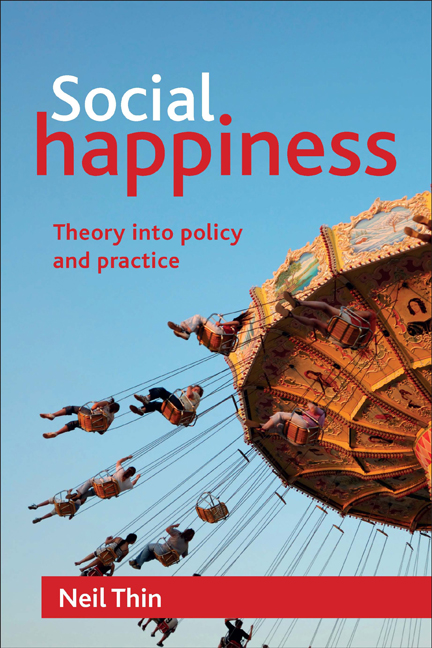seventeen - Conclusions: review and prospects
Published online by Cambridge University Press: 01 September 2022
Summary
Reviewing the benefits of the happiness lens
Not all readers, by this point, will be persuaded that a happiness lens implies a radical shake-up of social research or social policy. But I trust it will not have been possible to read these pages without being convinced, if you weren't already, of two things: that evaluative claims about ethics, progress, goodness, or altruism are all inadequate and potentially dangerous without some use of happiness criteria; and that happiness criteria have been curiously absent or downplayed in many of our treasured disciplines.
We have also seen that the deployment of happiness scholarship in policy and practice has two seemingly contradictory tendencies. On the one hand, it is about respecting people's own opinions on the qualities of their lives and experiences. On the other hand, it is about recognising the limits of people's ability to understand and/or act on what is good for them. Ironically, we need to assess happiness outcomes and develop and disseminate happiness scholarship precisely because people are so easily led astray and so readily make mistakes and mispredict what will make them or other people happy.
Perhaps the biggest single potential advantage of the happiness lens is that by respecting subjectivity we are promoting a way of evaluating lives and institutions that cuts through many of the problems of cultural and institutional bias. Particularly in cases where one set of people wants another to be happy but finds it hard to appreciate or understand their preferences, happiness information promotes empathic evaluation where the use of culture-specific evaluative criteria would promote misunderstanding and empathy barriers. For example, as is increasingly the case, if parents want to understand what is good for their children, it is often extremely hard for them to assess their children's cultural world, which is so different from the one they grew up in. However hard I try, aged over 50, I’m unlikely ever to be able to fully appreciate the goods and harms of my children's net-generation culture. But by enquiring into what brings them happiness and how, I can avoid the common mistake of misjudging their life quality by applying my generation's cultural values to theirs.
- Type
- Chapter
- Information
- Social HappinessTheory into Policy and Practice, pp. 235 - 246Publisher: Bristol University PressPrint publication year: 2012

